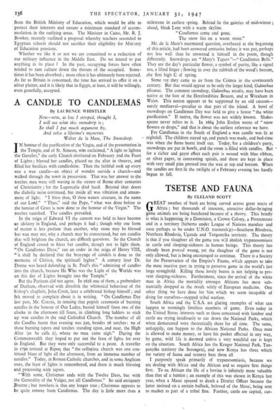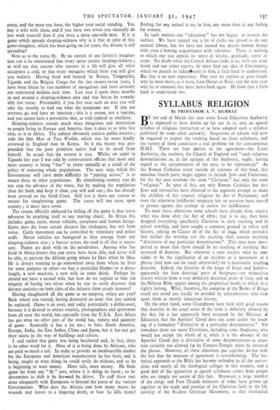TSETSE AND FAUNA
By CLELAND SCOTT
GREAT swathes of bush are being carved across great tracts of Africa ; but thousands of innocent, attractive dollar-bringing game animals are being butchered because of a theory. This briefly is what is happening in a Dominion, a Crown Colony, a Protectorate and in a territory (hitherto under League of Nations mandate and soon perhaps to be under U.N.O. trusteeship)—Southern Rhodesia, Northern Rhodesia, Uganda and Tanganyika territory. The theory is that if you slaughter all the game you will abolish trypanosomiasis in cattle and sleeping-sickness in human beings. This theory has already been proved wrong, yet the slaughter of the game is not only allowed, but is being encouraged to continue. There is a Society for the Preservation of the Empire's Fauna, which appears to take the most inactive part in trying to preserve game in the world's last large stronghold. Killing these lovely beasts is not helping to pre- vent sleeping-sickness. Furthermore, since the arrival of the white man in Africa the mortality amongst Africans has most sub- stantially dropped as the result solely of European medicine. One other thing we have done for him which we seem incapable of doing for ourselves—stopped tribal warfare.
South Africa and the U.S.A. are glaring examples of what can happen to seemingly limitless numbers of game. Even today in the United States interests such as those concerned with lumber and cattle are trying insidiously to cut down the National Parks, which when demarcated were theoretically there for all time. The same, unhappily, can happen to the African National Parks. Once man is allowed to make money, or have his pocket affected in any way, by game, wild life is doomed unless a very watchful eye is kept on the situation. South Africa has the Kruger National Park, Tan- ganyika territory the Serengetti, and now Kenya has three which for variety of fauna and scenery beat them all
I purposely speak primarily of trypanosomiasis, because we are dealing with Africa and the African and so require first things first. To an African the life of a bovine is infinitely more Valuable than that of a htinian ; an example of this was shown in Kenya last year, when a Masai speared to death a District Officer because the latter insisted on a certain bullock, beloved of the Masai, being sent to market as part of a tribal fine. Further, cattle are capital, cur-
rency, and the more you have, the higher your social standing. You buy a wife with them, and if you have two wives you naturally do less work yourself than if you were a mere one-wife man. If it is game which spreads sleeping-sickness why is it that in spite of this game-slaughter, which has been going on for years, the disease is still spreading?
Next as to the tsetse fly. By no stretch of any fanatic's imagina- tion can it be maintained that every tsetse carries sleeping-sickness ; as well say that anyone who sneezes in a lift will give all other occupants a cold, or that every mosquito which bites you will give you malaria. Having lived and hunted in Kenya, Tanganyika, Uganda and the Belgian Congo -for the last twenty-seven years, I have been bitten by vast numbers of mosquitoes and have certainly not contracted malaria each time. Last year I spent three months in and around a sleeping-sickness area and was bitten by remark- ably few tsetse. Presumably if you live near such an area you will take the trouble to find out what the symptoms are. If you are nervous, go and have an injection ; this is a serum, not a vaccine, and you cannot have a preventive shot, as with typhoid or smallpox.
Sleeping-sickness sounds much more dangerous and mysterious to people living in Europe and America than it does to us who live close to it in Africa. The subject obviously attracts public interest ; vide the film Men of Two Worlds, which was far more kindly reviewed in England than in Kenya. In it the theory was pro- pounded that the poor primitive native had to be saved from himself. In actual fact the reverse is true. Whilst on safari in Uganda last year I was told by tsetse-control officers that more and more country is being "lost" to tsetse annually as a result of the policy of removing whole populations. The next step, which the Government will have more difficulty in " putting across," is to return these or other populations. By abandoning country you do not stop the advance of the tsetse, but by making the population clear the bush, and keep it clear, you will and can ; this has already been proved on the Gold Coast. Still less is there any reason or excuse for slaughtering game. The tsetse will not cross open country ; it must have cover.
The reason officially adduced for killing off the game is that tsetse advances by attaching itself to any moving object. In Africa this includes game, cattle, motor vehicles, aeroplanes and human beings. Game does die from certain diseases like rinderpest, but not from tsetse. Cattle movement can be controlled by veterinary and police staffs. Motor vehicles are fumigated as they emerge from any sleeping-sickness area ; a barrier across the road is all that is neces- sary. Planes are dealt with on the aerodromes. Anyone who has lived in Africa knows that you never have been able, and never will be able, to prevent the African going where he likes when he likes. He is always wanting to go somewhere away, from where he lives for some purpose or other—to buy a particular blanket or a dress- length, a new machete, a new wife or some drink. Perhaps he should not have a second wife, but how do we explain to him the iniquity of having two wives when he can so easily discover that divorce statistics on both sides of the Atlantic show steady increase?
Having slaughtered all the game to no purpose, where are you? Back where you started, having destroyed an asset that just cannot be replaced. Game is an asset, and today particularly a dollar-asset, because it is desired to attract tourists, photographers and sportsmen from all over the world, but especially from the U.S.A. East Africa has got what no other part of the world has, variety and quantity of game. Scenically it has a lot too ; so have South America, Europe, India, the East Indies, China and Japan, but it has not got their assets in the way of buildings and culture.
I said earlier that game was being butchered and, in fact, there is no other word for it. Most of it is being done by Africans, who are paid so much a tail. In order to provide an inexhaustible market for the European and American manufacturer he has been, and is being, taught to want things he could easily do without, and so he is beginning to want money. More tails, more money. He finds game far from any " fly" area, where it is doing no harm ; so he determines to shift it by fire-and by drives. To staff these vast areas adequately with Europeans is beyond the purse of the various Governments. What does the African care how many beasts he wounds and leaves to a lingering death, or how he kills them? Feeling for any animal is not in him, any more than is any feeling for women.
In such matters our " education" has not begun to scratch the surface. We have turned out a lot of clerks too proud to do any manual labour, but we have not turned out decent human beings with even a bowing acquaintance with tolerance. There is nothing to which one can appeal, no sense of loyalty, gratitude, esprit de corps. No doubt when the Central African looks at us, with our atom bomb and our crime reports, he must find our idea of Christianity, which we preach so industflously to him, a little hard to understand. But that is no new experience. One year we explain at great length why he must move, as it were, from Dorset to Kent, and the next year why he or someone else must move back again. He finds that a little hard to understand too.



































 Previous page
Previous page